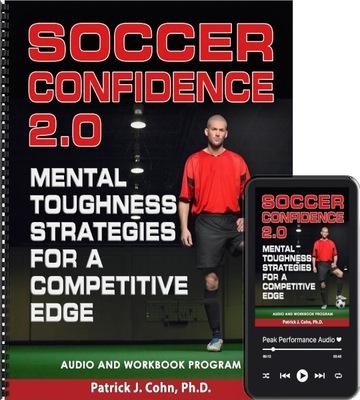
Perform at Your Best with Proper Mindset
Do you set high standards for your performance every game? Do you believe that setting the bar extremely high leads to performing your best?
Let’s look at this question in reverse. If your standards are low, will you perform at a high level?
Of course not. Low standards will lead to low effort. If you have low standards, you will not put in the work to improve your game. Thus, if you have low standards, you will under perform.
Now, let’s look at the opposite. Do you think having excessively high standards leads to peak performance? Is never being satisfied the key to motivating yourself to greater heights?
Interestingly, excessively high standards or expectations lead to frustration and under performance.
Never being satisfied or happy with your performance is a characteristic of perfectionism. Perfectionism is an unattainable ideal that leads to negative emotions and less confidence.
If you have excessively high standards or demand perfection, you will always be frustrated with your level of performance. No matter if you win or lose, you will point out every mistake. When you nitpick every detail of your performance, you will become frustrated. Dwelling on all your faults and mistakes leads to low confidence and frustration.
Let’s clarify the difference between high standards and excessively high standards.
Having high standards is the pursuit of improvement, not a demand for perfection.
When you have high standards, you will be more objective in your evaluation after a performance. You understand you can learn from both the positive and negative aspects of performance.
Recognizing your strengths keeps confidence high while still maintaining motivation to work on your game.
Let’s examine having high standards with the following example. Fran Kirby is an English professional soccer player who plays as a forward for Chelsea and England’s National Team.
Even after a game where she made three assists and led Chelsea to a victory, Kirby didn’t appear satisfied with her play.
After the game, Chelsea manager Emma Hayes commented on Kirby’s mindset and high standards.
HAYES: “Fran’s standards are through the roof, so she’s always frustrated. That’s the measure of her and why she is as good as she is. She thinks there’s always room to improve.”
Here lies the misconception about standards. Is Kirby actually frustrated, or does she believe she still can grow her game by working on a few things?
A good measuring stick to determine if your standards are excessively high is how much you judges your game during every play.
If you dwell on mistakes and this causes a loss of focus in the moment, your standards are probably too high and need to be re-evaluated.
Managing Expectations:
If you’re critical about your performance after games, ask yourself the following questions:
Am I demanding perfection from myself? If so, why do I need to be perfect? What do mistakes say about me as an athlete or person?
Recognizing self-sabotaging expectations and replacing with small objectives can help you have more fun and be less critical.
Focus on feeling confident in your skills instead of demanding perfection.
Related Sports Psychology Articles
- How Elite Soccer Players Raise the Bar and Achieve Excellence
- Confidence Leads to Success In Soccer
- How to Train Yourself to Mentally Reset during a Soccer Game
- Subscribe to The Sports Psychology Podcast on iTunes
- Subscribe to The Sports Psychology Podcast on Spotify
Download a free sports psychology report to improve your mental game!
Learn more about our one-on-one mental game coaching.
Boost Confidence in Soccer

“Soccer Confidence 2.0” 3-CD and Workbook program is the most comprehensive mental game program we’ve offered to the public. We’re virtually giving away all our mental game secrets for the incredibly low price of only $197.00 including the free bonuses!
“Soccer Confidence” is a complete brain dump of the TOP NINE mental training sessions we teach our soccer players to help them boost their mental game and improve consistency – from how to mentally prepare for games to performing under pressure to building unstoppable confidence.
